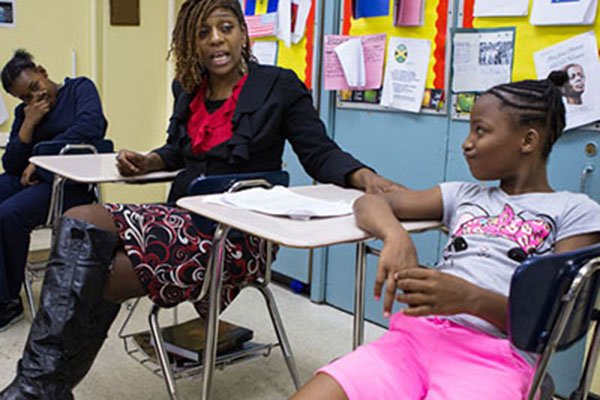
01/24/2025
Althea "Faith" Shaw-Hester ’88, whose do-what-it-takes approach to teaching New York’s most disadvantaged youth was highlighted in a 2013 Pulitzer Prize-winning New York Times article and subsequent book, will deliver the keynote address at SUNY Cortland’s third annual Abraham Lincoln DeMond 1889 Day.
Shaw-Hester, who currently teaches older, under-credited students at Mott Haven Community High School in the Bronx, N.Y., will address “How to Finish What You started” on Saturday, Feb. 1.
Her talk, at 6 p.m. in Brockway Hall Jacobus Lounge, will focus on how today’s first-year students can get off to a great start.
“I’ll just be giving them some practical steps to finishing what they initiated in order to give them a smoother ride,” Shaw-Hester said. “The ride is not going to be bump free but it doesn’t need to be as tumultuous as for me.”
The event, which marks the official start of SUNY Cortland’s 2025 Black History Month event series, is free and open to the public. An RSVP to attend the event is requested.
Refreshments will be served, courtesy of the SUNY Cortland Alumni Association. Event sponsors include the Student Government Association, SUNY Cortland Alumni Association and the Institutional Equity and Inclusion office.
“I chose Faith as our keynote speaker for Abraham Lincoln Demond Day because she is a Cortland alum from Brooklyn, N.Y., where I grew up,”" said organizer Dwayne Jones, the SGA director of diversity, equity and inclusion and a senior biology major. “Also, her dedication to giving back to the community as a teacher made her the perfect fit. I hope that other students can see themselves in her and use her as a role model.”
Shaw-Hester’s story began with her fleeing New York’s mean streets for SUNY Cortland’s lifeline, only to return to Brooklyn years later as a dedicated educator, determined to help lift her old neighborhood’s children out of poverty, danger and tragedy.
“Invisible Child: Dasani’s Homeless Life,” a gripping tale of both hope and despair, was first published in 2013 as a five-part series focusing on Dasani, a homeless girl who was a student of Hester’s. At the time, Shaw-Hester was a humanities teacher at Susan S. McKinney Secondary School of the Arts. The story, by Pulitzer Prize-winning journalist Andrea Elliott, served as a lens into the lives of the approximately 22,000 homeless children living in New York City.
The story was lauded by readers, and Hester stood out as one of its most inspiring heroes — the veteran teacher brimming with energy and creativity despite challenging circumstances, the one who treats an entire classroom of students as if they all are her adopted children.
Shaw-Hester earned renewed attention for her classroom style in 2021, when Elliott released Invisible Child, a 624-page, highly rated National Bestseller book encompassing the groundbreaking series, described by The New York Times reviewer as a “vivid and devastating portrait of a young girl.”
“She’s still living in the city,” Shaw-Hester said of Dasani. “I don’t think she’s finished college yet. They (her family) are definitely out of the shelter. When I last met with her mom, she was doing better.”
Shaw-Hester herself grew up near where Dasani’s story takes place in Brooklyn’s notorious Marcy public housing project, where she witnessed brutal assaults and learned first-hand the devastating impact of widespread heroin and crack cocaine addiction on her neighbors. As a child, she saw people being wheeled out from her family’s apartment building on ambulance gurneys, the victims of shootings.
College in Cortland was her ticket away from there for good.
“I was running away from home ’cause I grew up in the projects too,” Shaw-Hester said. “My guidance counselor promised to get me an ‘away school’ because my parents didn’t want me to leave.
“My journey at Cortland was not linear,” she said. “If I had been more strategic, it wouldn’t have been as hard for me.”
At Cortland she met like-minded people with big-picture aspirations. She also discovered the New York Public Interest Research Group (NYPIRG), which allowed her to travel across the state and lobby for important social causes like an end to apartheid in South Africa. Shaw-Hester would later earn two master’s degrees in education.
Her current employer serves a similar population as McKinney. Hester still goes the extra miles, meeting with parents and stepping in sometimes to make sure kids can get adequately fed during school breaks. Some of the students have children themselves or live in shelters. More of them have special needs.
“They need love, they need people to listen to them, they need people to set boundaries for them until they can set them for themselves,” Shaw-Hester said.
Several former students were lost to violence during her career.
“Two years ago, we buried a student who was trying to get out of the game,” she said. “I know it was his birthday the next day, and he and his brother went out and got shot in front of his building.
“I do sometimes get visited by the ones who made it. It’s awesome,” Shaw-Hester said. “They say, ‘Look Ms. Hester!’ and they show me their college diploma. … One said, ‘I want you to be there when my child is born.’”
Abraham Lincoln DeMond 1889 Day was initiated in 2023 to honor DeMond, Cortland’s first Black alum. He graduated just 24 years after the Civil War and became a leader in the national fight against the prejudicial policies and segregation that were enforced across much of the United States, and calling for full rights as American citizens.
Born in Seneca, N.Y., he attended the Cortland Normal School — the institution that later became SUNY Cortland. After graduation, DeMond studied theology at Howard University in Washington, D.C., and became pastor of Dexter Avenue Baptist Church in Montgomery, Alabama, the same church from which Martin Luther King Jr. would one day help launch the civil rights movement.
Select an image below to begin a slide show.



